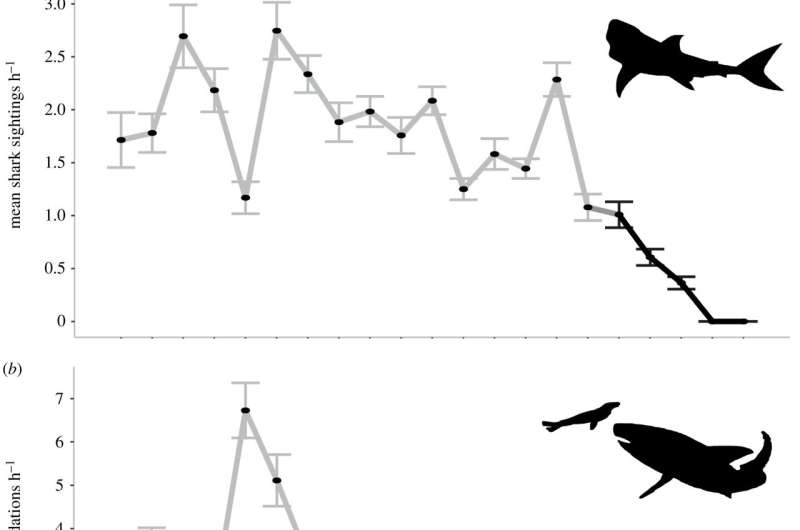Changes measured in prey behavior during loss of apex predators

A team of researchers has documented the changes that occurred to a type of prey (cape fur seals) when their predator (great white sharks) disappeared from their environment. In their paper published in the journal Biology Letters, the group describes their study of the seals both before and after the sharks left the environment.
As the researchers note, much research has been conducted regarding the impact on prey when new predators enter an environment, but few efforts have sought to learn more about the opposite scenario. In this new effort, the researchers found a unique opportunity to learn more about what happens to prey in general when a predator departs—for whatever reasons—when great white sharks began disappearing from the shores of South Africa.
Prior research has shown that approximately 1.5 to 2 million cape fur seals live along South Africa’s coasts and nearby islands. Research has also shown that the only predator of cape fur seals has been great white sharks because the seals are too large to be bothered by other meat-eating ocean dwellers. Ocean scientists in the area began to notice declines in the number of great white sharks living in the area in 2015 and since that time, they have disappeared from the area entirely, though it is still not clear why. With the disappearance of the sharks, the researchers found themselves with a golden opportunity to learn more about what happens to prey when their predator is removed from the scene.
The work by the team first involved simply watching the seals as they went about their normal lives to see if they could spot any behavioral changes. They found that the seals began venturing farther out to sea and rafting over deeper waters—activities that would have previously put them at an increased risk of an attack.
The researchers also began comparing seal scat samples gathered from beaches from the time before the sharks disappeared to after. The scat contains traces of fecal glucocorticoid concentrations, which can be used to measure stress levels. Researchers found that the stress levels of the seals were greatly reduced after the sharks disappeared.
Stress test: New study finds seals are stressed-out by sharks
Neil Hammerschlag et al, Loss of an apex predator in the wild induces physiological and behavioural changes in prey, Biology Letters (2022). DOI: 10.1098/rsbl.2021.0476
© 2022 Science X Network
Citation:
Changes measured in prey behavior during loss of apex predators (2022, February 2)
retrieved 2 February 2022
from https://phys.org/news/2022-02-prey-behavior-loss-apex-predators.html
This document is subject to copyright. Apart from any fair dealing for the purpose of private study or research, no
part may be reproduced without the written permission. The content is provided for information purposes only.
For all the latest Science News Click Here
For the latest news and updates, follow us on Google News.

